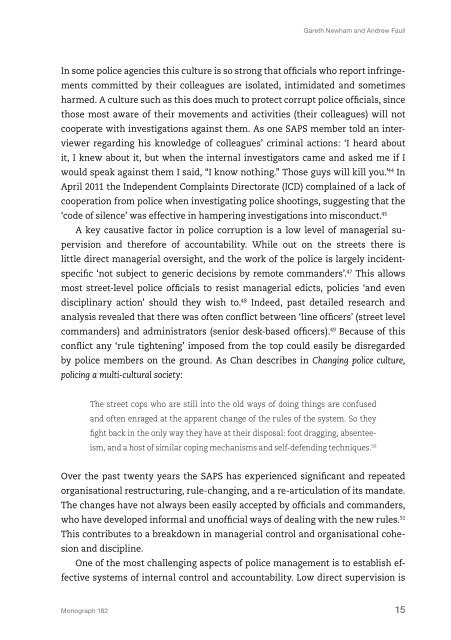Protector or predator? - Institute for Security Studies
Protector or predator? - Institute for Security Studies
Protector or predator? - Institute for Security Studies
Create successful ePaper yourself
Turn your PDF publications into a flip-book with our unique Google optimized e-Paper software.
Gareth Newham and Andrew Faull<br />
In some police agencies this culture is so strong that officials who rep<strong>or</strong>t infringements<br />
committed by their colleagues are isolated, intimidated and sometimes<br />
harmed. A culture such as this does much to protect c<strong>or</strong>rupt police officials, since<br />
those most aware of their movements and activities (their colleagues) will not<br />
cooperate with investigations against them. As one SAPS member told an interviewer<br />
regarding his knowledge of colleagues’ criminal actions: ‘I heard about<br />
it, I knew about it, but when the internal investigat<strong>or</strong>s came and asked me if I<br />
would speak against them I said, “I know nothing.” Those guys will kill you.’ 44 In<br />
April 2011 the Independent Complaints Direct<strong>or</strong>ate (ICD) complained of a lack of<br />
cooperation from police when investigating police shootings, suggesting that the<br />
‘code of silence’ was effective in hampering investigations into misconduct. 45<br />
A key causative fact<strong>or</strong> in police c<strong>or</strong>ruption is a low level of managerial supervision<br />
and theref<strong>or</strong>e of accountability. While out on the streets there is<br />
little direct managerial oversight, and the w<strong>or</strong>k of the police is largely incidentspecific<br />
‘not subject to generic decisions by remote commanders’. 47 This allows<br />
most street-level police officials to resist managerial edicts, policies ‘and even<br />
disciplinary action’ should they wish to. 48 Indeed, past detailed research and<br />
analysis revealed that there was often conflict between ‘line officers’ (street level<br />
commanders) and administrat<strong>or</strong>s (seni<strong>or</strong> desk-based officers). 49 Because of this<br />
conflict any ‘rule tightening’ imposed from the top could easily be disregarded<br />
by police members on the ground. As Chan describes in Changing police culture,<br />
policing a multi-cultural society:<br />
The street cops who are still into the old ways of doing things are confused<br />
and often enraged at the apparent change of the rules of the system. So they<br />
fight back in the only way they have at their disposal: foot dragging, absenteeism,<br />
and a host of similar coping mechanisms and self-defending techniques. 50<br />
Over the past twenty years the SAPS has experienced significant and repeated<br />
<strong>or</strong>ganisational restructuring, rule-changing, and a re-articulation of its mandate.<br />
The changes have not always been easily accepted by officials and commanders,<br />
who have developed inf<strong>or</strong>mal and unofficial ways of dealing with the new rules. 51<br />
This contributes to a breakdown in managerial control and <strong>or</strong>ganisational cohesion<br />
and discipline.<br />
One of the most challenging aspects of police management is to establish effective<br />
systems of internal control and accountability. Low direct supervision is<br />
Monograph 182 15

















